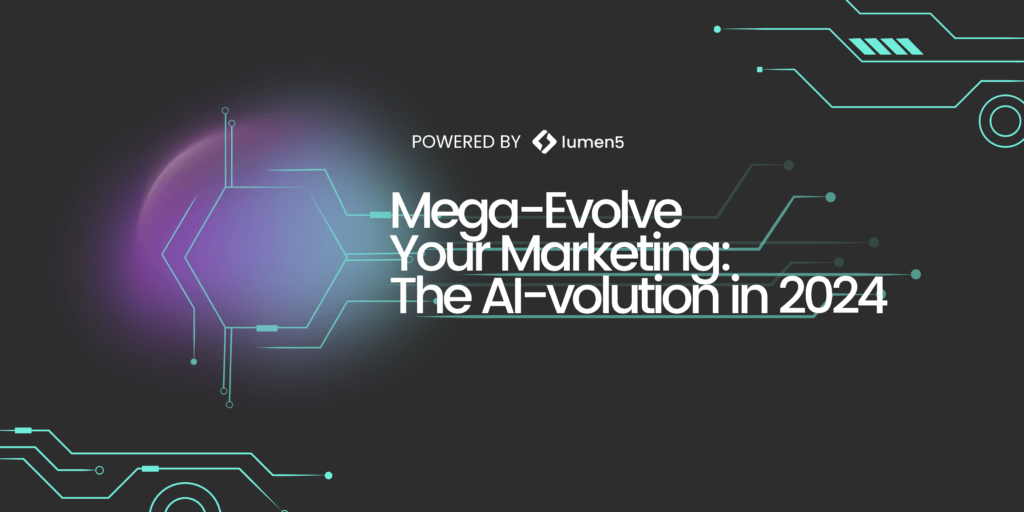
Almost one year ago, I wrote Part 1 when AI first hit the public scene. And as each day passes, advances happen in AI and with companies using AI.
We have been a player in the AI space for over 7 years, and we have seen significant AI growth in the last 6 months – at a faster rate and volume than before. There’s been discussions happening and questions circulating, despite it only be January – not just internally at Lumen5, but also other companies who are impacted by its quick growth.
Recently, we put out a survey about AI for Marketing to get a pulse on other marketers and their thoughts on AI in Marketing in 2024 and after a preliminary look at the results, I compiled the top few trending questions. So here we go.

Check out the data from our 2024 AI for Marketers Survey!
- Who are the big players in AI and what’s going on?
- What is something huge to watch out for this coming year?
- Because AI can help with more mundane tasks, where should I be focusing my time?
- How will new government AI regulations impact AI usage (if at all) in 2024?
- Will the world of marketing be forever changed?
Who are the big players in AI and what’s going on?
OpenAI? Google? Microsoft? Meta? NVIDIA? Amazon?
2023 was an insane year! Llama 2. GPT-4. SD XL, Midjourney V5 and SVD. DALL-E 3. All more complicated than Elon Musk’s child’s name spelling and pronunciation. 👶🏼
And towards the end of 2023, Meta workers talked about trying to make world models work and Google launched Gemini. As of yesterday, Google just launched Lumiere, another one of Google’s AI tools. Sounds oddly familiar, no?
Lmao Google just casually drops the best AI video generator pic.twitter.com/cP7rFbGHzw
— Sully (@SullyOmarr) January 24, 2024
The race continues as companies continuously launch AI teams and hire AI experts to solidify their place as #1. But who will come out on top? Maybe that’ll become more clear in 2024 with bigger milestones and goals for these companies – and as more small start ups make a huge splash and enter the scene. And instead of focusing on the “who”, what matters most are the tools that will have a positive impact on our day to day as marketers.
What is something huge to watch out for this coming year?
What I truly think will be a game-changer: AI voice cloning and dubbing.
We’ve already seen it and heard it. Tiktok has been flooded with AI voice covers of artists singing other artists’ songs, but for marketing and enterprise businesses – this can easily be integrated into videos and creating a brand identity around the brand voice and tone – literally.
Late last year, we launched our AI Voiceover partnership with ElevenLabs and saw video creation numbers shoot through the roof with over 100k voiceover videos created. What does that really tell us about voices in videos? You could easily say that video creation is increasing heavily, but let’s take that insight one step further:
Marketers are going to rely on voices more heavily to convey emotions and messaging, along with creating a memorable brand identity.
Because AI can help with more mundane tasks, where should I be focusing my time?
Focus on areas where AI can’t be as useful or personable, such as providing context into the deep world of analytics or being fully present and building a community.
AI can 100% help analyze the raw metrics and facts, but only you can properly situate the data in a place that makes sense for you and your work. No point having dishware if you don’t have a table or cupboard to store them, right?
I do think that eventually enhanced analytics will come – AI will diminish some of the difficulty of understanding and linking data analytics and increase the amount of actionable insights that will improve audience experiences.
But in the mean time, clearly define the KPIs that align with your marketing objectives. AI-driven predictive analytics should focus on delivering insights that directly impact these key metrics, whether it’s customer engagement, conversion rates, or other relevant performance indicators.
I think time should also be spent in building a community. Yes, it’s true, AI can help you figure out the steps on how to start an online community. And AI can also help you write and keep a content calendar to try to help engage your newly found community. (An easy google and step by step tutorial) But online communities are all about relating and building relationships with one another – that’s something AI still can’t do. As much as it can come close to becoming and understanding human, it still lacks in being personable and compassionate where humans naturally thrive.
How will new government AI regulations impact AI usage (if at all) in 2024?
US, China, Singapore, Europe – you name it! There has been talk about implementing government regulations and laws around generative AI. Even Bill Gates and Sam Altman discussed this topic during their interview together and it also took center stage as a huge topic at the World Economic Forum.
According to the International Monetary Fund, almost 40% of employed people in the world are exposed to AI, which rises to 60% in advanced economies. And in the first few weeks of 2024, many countries (including the few listed earlier) have already enacted AI regulation laws (13 states in the US) as they try to react on this new reality.
And although Europe has an AI Act in place since December 2023, other neighbouring countries are taking a more hands-off approach to AI. For example, the UK does not intend to regulate AI as it it is the home of Google DeepMind.
MIT technology review writers Tate Ryan-Mosley, Melissa Heikkila, and Zeyi Yang sum it up really well:
Geopolitically, we’re likely to see growing differences between how democratic and authoritarian countries foster—and weaponize—their AI industries. It will be interesting to see to what extent AI companies prioritize global expansion or domestic specialization in 2024. They might have to make some tough decisions.
Tate Ryan-Mosley, Melissa Heikkila, and Zeyi Yang, MIT Technology Review
Will the world of marketing be forever changed?
I’ve seen some crazy things happen on the image editing front, such as Canva and Adobe’s “expanding” or “removing” editing tools. And I’ve also seen some super neat work on AI prompting, like Phil Taylor using ChatGPT to create his own marketing team. Enterprise businesses like Best Western utilize Lumen5’s AI to create 50+ videos weekly and quickly.
I’m not insinuating that AI will replace marketers or take jobs – I think that thought is far out of our minds. But I do believe that our skillsets will need to shift towards leaning on AI more for things beyond the “mundane tasks”.
As generative AI capabilities increase and new tools are made available left and right, we as marketers need to adapt and seize any opportunities that AI presents. Let’s pave the way for a marketing landscape that is not just efficient but genuinely exciting – striking the perfect balance between innovation and authenticity. And of course, being regulated and safe!!
The AI-volution is here!
More questions or interested in more conversations about AI and marketing in 2024? Check out our webinar!
Our webinar focuses on the future of AI for businesses. The AI-volution in 2024 will discuss key takeaways and exclusive POVs from AI experts about how they’ve built and implemented AI-based companies from the ground up. Discover the latest trends, practical insights, and expert perspectives that will empower the way you approach marketing and empower you to supercharge your marketing in 2024 and beyond.
As we step into 2024, let’s seize the opportunities that AI presents and pave the way for a marketing landscape that is not just efficient but genuinely exciting – striking the perfect balance between innovation and authenticity.
Everything video, AI and marketing. All in one place.
Want to incorporate AI into your workflow? We’ve got you covered. With our tips and tricks, elevate your content game and strategy to win over leads.
Sign up and join 1000+ other marketers:







